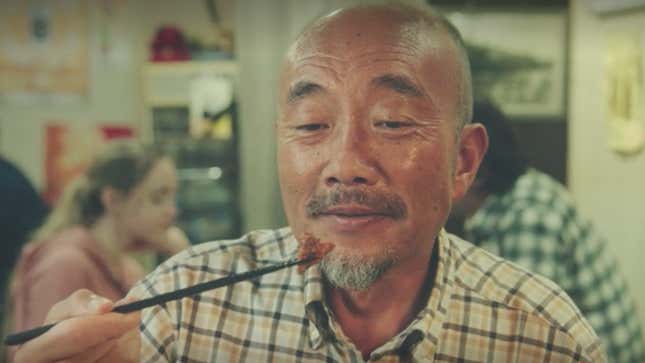
Lately I’ve been watching a bit too much TV, which has led to the seemingly impossible problem of running out of TV to watch. Between all the different streaming services, there’s no dearth of stuff I haven’t seen before, but sometimes I just want something familiar. I know this is hard to believe, but there’s only so many times you can watch Futurama or Bob’s Burgers before you need something else. One show I will never get tired of, though, is Netflix’s Samurai Gourmet.
Samurai Gourmet is a 2017 Netflix show, based on a manga, that I discovered thanks to our sister site, Splinter. It stars a 60-year-old Japanese retiree named Takeshi Kasumi who spends his free time wanting to eat things and then eating them. He’s adrift without work and anxious about everything: whether he should take his sunglasses off inside, whether he should season something, whether he should try something new. In every episode, a vision of a samurai appears to him and convinces him to do the thing he wants to do.
Episodes are about 20 minutes, and they all follow the same simple format. In the first episode, “Mid-Day Beer at a Restaurant,” Kasumi goes for lunch and really wants a beer. But he feels like he shouldn’t have a beer at lunchtime. Then, he imagines his samurai alter ego strolling in, ordering sake, rebuffing the fantasy patrons who insult him for day drinking, and enjoying his sake. This inspires Kasumi to order his beer, which he chugs triumphantly, thinking, “I could get used to this.”
In other episodes, Kasumi debates too long about speaking up to a rude patron at a bar until the samurai inspires him. He vacillates about ordering more breakfast at a seaside inn until he pictures the samurai energetically enjoying a breakfast of his own. There’s a somewhat awkward subplot about his relationship with his wife, but the main focus of the show is his desire to eat things and all the worrying he does before he decides to eat them.
There’s food porn—gratuitous shots of frying meats and simmering soups—but the foods themselves are usually pretty simple fare. Kasumi finds everything delicious, and he often exclaims that the best way to eat whatever food he’s eating is the way he’s eating it at the moment. He savors everything with almost over-the-top gusto. It could feel out of place—how good could that diner food really be?—but his enjoyment isn’t about the quality of the food as much as the mundane but still harrowing journey he takes to putting it in his mouth. Kasumi is discovering or rediscovering food as much as he’s learning how to live after retirement. He’s learning how to fill his time and listen to his desires now that he doesn’t have an external force like work doing it for him. He sees his enjoyment as rebellious, a belief reinforced by his samurai fantasies, even though he’s not so much blazing his own path as deciding he’s allowed to be like other people. He’s learning to allow himself pleasure, not through fancy or expensive food, but through appreciating the abundance of everyday life. He’s convincing himself he deserves joy.
I’ve watched Samurai Gourmet’s 12 episodes over and over. I’m one of those people who almost never speaks up when a waiter brings the wrong thing, and I have a terrible time trying to decide what to order in restaurants. I relate to how insurmountable Kasumi’s desires seem—he really wants fried chicken, but he shouldn’t have fried chicken. But then he has fried chicken and it’s great! The show never feel ridiculous or mocking of Kasumi’s struggles; it’s full of kindness for him and many of its other characters. Samurai Gourmet’s small dramas are things all of us have likely experienced in one form or another, and the show’s celebration of regular eating habits reminds me of the best episodes of Anthony Bourdain shows. I always come away the show feeling a little better about my own tendency toward indecision, as well as a little more excited about whatever I’m having for dinner.